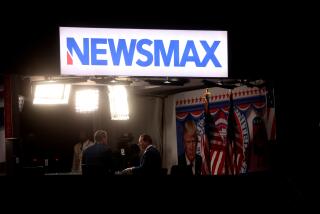N.M. Settles Part of Antitrust Suit Against Microsoft
- Share via
New Mexico agreed Thursday to drop its part of the landmark antitrust lawsuit against Microsoft Corp. in exchange for legal costs and a commitment that any remedies won by the other states and the federal government would apply equally in that state.
New Mexico Atty. Gen. Patricia Madrid said she hoped her surprise move would “help open the way for the remaining parties to pursue realistic settlement terms” that are less severe than a breakup sought by some of the remaining 17 states and the District of Columbia. “We have won what I wanted to win,” Madrid said.
Microsoft spokesman Vivek Varma said the company hoped to strike a deal with its other foes.
But Iowa Atty. Gen. Tom Miller, one of the leaders in the case, said the company had approached other states and found no takers.
“I think the rest will stay together,” Miller said. “The big thing is, we have the core to do the case.”
New Mexico’s suit had been filed before Madrid took office, and she had not been a forceful presence in the state coalition, attorneys said.
The settlement is the second sign of rapprochement efforts this week by the software giant.
On Wednesday, Microsoft said it would allow computer manufacturers to put its competitors’ icons on the initial screens of machines with the upcoming Windows XP operating system. Those icons would make it easier for consumers to connect with America Online for Internet access and RealNetworks Inc. to play videos and music on their computers.
Madrid said she welcomed that step, which other states said was far from a complete solution to the lawsuit.
In their suit, the Justice Department and the states accused Microsoft of violating antitrust laws by using its monopoly power in operating systems to squelch new technologies, including Netscape’s Web browser.
Last month, the U.S. Circuit Court of Appeals for the District of Columbia overturned a lower court’s order that Microsoft be broken in two, but upheld the monopoly findings.
The appeals court said further hearings were needed on whether the company broke more laws in bundling its products and on how Microsoft should be punished.
While the Justice Department, the states and Microsoft all say a settlement is the best solution, the states say no full-fledged talks are underway.
Last year, a proposed settlement fell apart when Microsoft would agree only to limited restraints on its future behavior.
Microsoft’s chief concern now is making sure it defeats any request for an injunction against Windows XP, its new operating system that is scheduled to ship in October.
Some states have said they plan to complain to the courts about Windows XP, saying that Microsoft is abusing its monopoly power by packing XP with new features to stifle competition.
The state officials are seeking either a breakup of Microsoft or new restrictions on Microsoft’s business practices.
But if Microsoft can weaken the alliance, that could help convince the remaining states and the federal government to accept a less onerous settlement.
“I expect a few more states” to drop away, said one lawyer working on the government’s side.
Under the settlement, New Mexico will get the benefits of any settlement Microsoft strikes with the government. The company agreed to pay the state’s legal costs of about $100,000, Madrid said.






